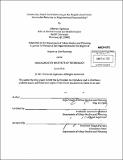Community-based social marketing at the neighborhood scale : sustainable behavior or neighborhood sustainability?
Author(s)
Lightman, Deborah
DownloadFull printable version (16.36Mb)
Other Contributors
Massachusetts Institute of Technology. Dept. of Urban Studies and Planning.
Advisor
Lawrence Susskind.
Terms of use
Metadata
Show full item recordAbstract
Social marketing has long been used in the field of public health, but its application in the environmental world is only a decade old. Although McKenzie-Mohr and Smith's (1999) guide to "community-based social marketing" (CBSM) has gained increasing support, there have been few attempts to delineate when CBSM can (and should) be used. In this thesis, I explore the use of CBSM at the neighborhood scale: first, to encourage the uptake of rain barrels and rain gardens; and second, to advance long-term sustainability as defined in the sustainable communities literature. My research focuses on the potential opportunities and limitations of CBSM in three very different neighborhoods in the Greater Toronto Area. Interviews with homeowners in the three neighborhoods revealed surprisingly high levels of rain barrel interest and ownership among people who do not self-identify as "environmentalists". I suggest that different CBSM strategies may be useful for promoting rain barrels among individuals who self-identify in different ways. In contrast, rain gardens received limited support from non-environmentalists and appeared challenging to promote. I suggest that CBSM programs to encourage rain gardens will be more effective if clearly tied to local issues. I outline strategies for increasing the local relevance of CBSM and highlight the benefits of including diverse residents at all stages of program design. Finally, I argue that practitioners should assess opportunities for CBSM to contribute to long-term neighborhood sustainability. In all three neighborhoods, CBSM holds little potential to directly address residents' sustainability priorities, since these issues require neighborhood-level efforts. However, modified versions of CBSM may be able to indirectly contribute to long-term sustainability by fostering social capital, attachment to place and awareness of links between environmental, economic and social issues.
Description
Thesis (M.C.P.)--Massachusetts Institute of Technology, Dept. of Urban Studies and Planning, 2011. Cataloged from PDF version of thesis. Includes bibliographical references (p. 113-119).
Date issued
2011Department
Massachusetts Institute of Technology. Department of Urban Studies and PlanningPublisher
Massachusetts Institute of Technology
Keywords
Urban Studies and Planning.